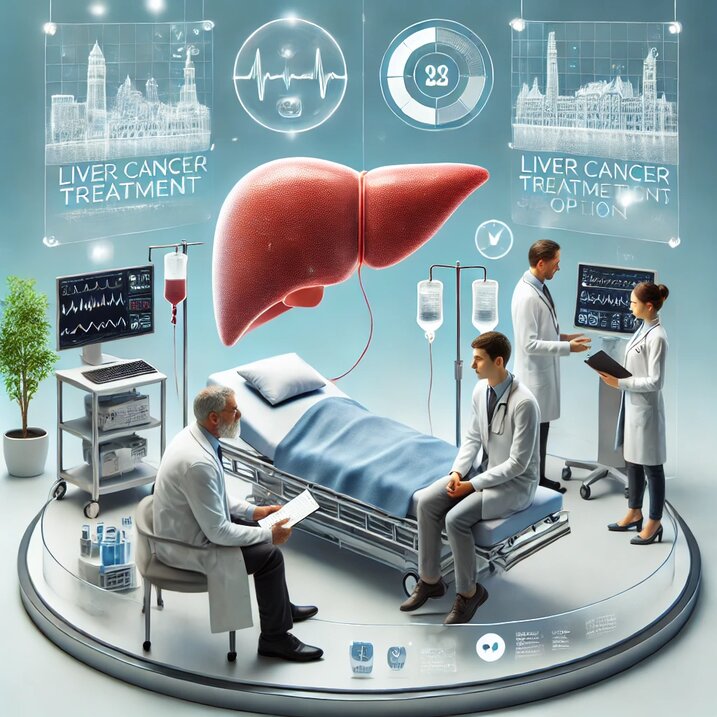Understanding Liver Cancer: What Are Its Causes?
Liver cancer occurs when abnormal cells grow uncontrollably in the liver, forming a tumor. The most common causes include chronic infections with hepatitis B or C, excessive alcohol consumption, fatty liver disease, and exposure to aflatoxins (toxins from moldy food). Genetic predisposition and conditions like cirrhosis also increase the risk. Early identification of these causes can help in prevention and timely treatment.
Medical disclaimer: This content is for general awareness and does not replace a doctor’s consultation. For diagnosis or treatment decisions, consult a qualified specialist.

How Is Liver Cancer Diagnosed?
The diagnosis of liver cancer typically involves imaging tests like ultrasound, CT scans, or MRI to detect abnormalities in the liver. Blood tests, including alpha-fetoprotein (AFP) levels, are also used as markers for liver cancer. In some cases, a biopsy may be performed to confirm the diagnosis. Early diagnosis plays a crucial role in improving treatment outcomes.
What Are the Early Symptoms of Liver Cancer?
Early symptoms of liver cancer can be subtle and often go unnoticed. Common signs include unexplained weight loss, loss of appetite, nausea, fatigue, and abdominal discomfort. Jaundice, swelling in the abdomen, or a palpable mass in the liver region may indicate advanced disease. Patients at risk are encouraged to undergo regular screenings to catch the disease in its early stages.
What Are the Main Types of Liver Cancer?
Liver cancer can be classified into primary and secondary types. Primary liver cancer originates in the liver itself, with hepatocellular carcinoma (HCC) being the most common type. Other forms include intrahepatic cholangiocarcinoma and angiosarcoma. Secondary liver cancer refers to cancer that has spread to the liver from other parts of the body. Understanding the type of cancer helps doctors tailor the most effective treatment plan.
What Are the Stages of Liver Cancer?
Liver cancer stages are determined based on the tumor's size, spread, and impact on liver function. The most common staging system is the Barcelona Clinic Liver Cancer (BCLC) staging, which classifies the disease into early, intermediate, advanced, and terminal stages. Each stage has distinct treatment options, with early-stage patients often benefitting from surgical resection or ablation, while advanced stages require systemic therapies like targeted therapy or immunotherapy.
What Are the Treatment Options for Liver Cancer?
The treatment for liver cancer depends on its stage and type. Early-stage liver cancer may be treated with surgical resection, ablation, or liver transplantation. Intermediate stages often require chemoembolization (TACE), while advanced stages benefit from systemic therapies like targeted therapy, immunotherapy, or Proton Beam Therapy. Combining therapies is common for achieving better outcomes in complex cases.
Is Liver Cancer Curable?
The curability of liver cancer depends on the stage at diagnosis. Early detection and timely treatment, such as surgery or transplantation, offer the highest chances of a cure. For advanced cases, while a complete cure may not be possible, treatments like targeted therapy and immunotherapy can extend survival and improve quality of life. Regular follow-ups are essential to monitor progress and manage the disease effectively.

How Can Liver Cancer Be Prevented?
Preventing liver cancer involves addressing its risk factors. Vaccination against hepatitis B, maintaining a healthy weight, and reducing alcohol consumption are key preventive measures. Early detection and management of hepatitis C and conditions like cirrhosis also play a vital role. A balanced diet and regular exercise can further lower the risk of liver cancer.
Liver Cancer Treatment Effective Therapies
Advanced therapies for liver cancer have revolutionized treatment, providing hope for patients across all stages. Below are some of the most effective therapies:
Radioembolization (TARE)
TARE therapy for liver cancer uses radioactive particles to deliver targeted radiation directly to liver tumors. It is particularly effective for patients with advanced liver cancer. Costs typically range from ₹4,00,000 to ₹6,00,000.
Chemoembolization (TACE)
TACE therapy for liver cancer combines chemotherapy and embolization to shrink tumors and slow disease progression. Costs range between ₹2,00,000 and ₹3,50,000 per session.
Targeted Therapy
Targeted therapy for liver cancer blocks specific pathways that help cancer grow. It is effective for managing systemic disease and often complements localized therapies. Costs range from ₹2,50,000 to ₹6,00,000 per cycle.
Proton Beam Therapy
Proton Beam Therapy for liver cancer delivers precise radiation with minimal side effects. It is an advanced option for patients with tumors near vital organs. Costs typically range from ₹20,00,000 to ₹30,00,000.
Recommended Reading for Liver Cancer Patients
Explore these resources for additional insights into liver cancer:
What Are the Common Risk Factors for Liver Cancer?
Several factors increase the risk of developing liver cancer. Chronic infections like hepatitis B or C, excessive alcohol consumption, obesity, and fatty liver disease are among the most common causes. Other contributing factors include genetic conditions, exposure to aflatoxins, and diabetes. Identifying and managing these risk factors can significantly reduce the likelihood of liver cancer.
How Does Liver Cancer Impact Quality of Life?
Liver cancer can affect various aspects of a patient’s life, including physical health, emotional well-being, and daily activities. Symptoms like fatigue, pain, and digestive issues can limit mobility and independence. Emotional challenges such as anxiety and depression are also common. Supportive care, including pain management and counseling, helps improve quality of life for liver cancer patients.
What Are the Advances in Liver Cancer Research?
Recent advances in liver cancer research include breakthroughs in immunotherapy, gene therapy, and targeted treatments. Clinical trials are exploring new drugs and combinations to enhance survival rates and minimize side effects. Techniques like liquid biopsies and molecular profiling are improving early detection and personalized treatment approaches, paving the way for more effective liver cancer care.
How Important Is Early Detection in Liver Cancer?
Early detection of liver cancer dramatically improves treatment outcomes. Patients diagnosed at an early stage have access to curative options like surgical resection or ablation, which can significantly extend survival. Regular screenings, especially for high-risk individuals, are essential for catching liver cancer before it progresses to advanced stages.
Top Hospital and Doctors for Liver Cancer Treatment in India
India is home to some of the best liver cancer treatment hospitals in india, offering world-class care at affordable prices. Prominent hospitals like Apollo Hospitals, Fortis Healthcare, and Tata Memorial Hospital are renowned for their advanced treatment facilities and cutting-edge therapies such as Immunotherapy, Targeted Therapy, and Radiofrequency Ablation (RFA).
The cost of liver cancer treatment in India is significantly lower compared to other countries, starting from INR 2,50,000 for minimally invasive therapies and going up to INR 20,00,000 for advanced options. For more details, check liver cancer treatment costs in India.
Some of the top doctors specializing in liver cancer include Dr. Arvinder Singh Soin, Dr. SKS Marya, and Dr. Ravi Mehrotra, who are known for their expertise in surgical and non-surgical approaches. Discover more about the best liver cancer doctors in India.
Explore detailed options for liver cancer care and therapies by visiting best liver cancer treatment in India.
Frequently Asked Questions (FAQs)
Can liver cancer be detected early?
Yes, regular screenings, especially for high-risk individuals, can detect liver cancer at an early stage. Blood tests for alpha-fetoprotein (AFP) and imaging tests like ultrasounds are commonly used for early detection.
What is the survival rate for liver cancer?
The survival rate depends on the stage of diagnosis. Early-stage liver cancer has a 5-year survival rate of up to 50-70% with timely treatment, while advanced stages may have lower rates.
How effective are treatments like TACE or TARE?
TACE and TARE are effective for managing intermediate and advanced liver cancer, helping to shrink tumors and extend survival. Combining these therapies with systemic treatments further improves outcomes.
Can lifestyle changes reduce the risk of liver cancer?
Yes, maintaining a healthy weight, reducing alcohol consumption, and avoiding hepatitis B and C infections can significantly lower the risk of liver cancer.
What is the cost of liver cancer treatment in India?
Costs vary based on treatment type: TACE costs ₹2,00,000 to ₹3,50,000 per session, targeted therapy ranges from ₹2,50,000 to ₹6,00,000, and Proton Beam Therapy can cost ₹20,00,000 to ₹30,00,000.
Which hospitals in India offer liver cancer treatment?
Leading hospitals like Tata Memorial Hospital, Apollo Hospitals, and AIIMS Delhi provide comprehensive liver cancer care, including advanced therapies.
Discover the Best Oncologists and Cancer Hospitals in India
When it comes to cancer treatment, finding the right specialist and hospital can make a significant difference in the outcome. In this blog, we have compiled a list of the top oncologists and cancer hospitals across major cities in India, ensuring that you have access to the best care available.
Top Oncologists in Major Cities
For those seeking expert oncologists, we have identified the best specialists in key cities:
Leading Cancer Hospitals
In addition to finding the right specialist, choosing the right hospital is crucial for comprehensive cancer care. Here are the top hospitals in major cities:
Get more indepth information on Cancer treatments and their costs
Conclusion
Finding the right oncologist and hospital is the first step in your cancer treatment journey. Explore the links above to learn more about the top specialists and hospitals in your area.
Chemoembolization, also known as TACE (Transarterial Chemoembolization), is a minimally invasive treatment used for liver cancer. It combines chemotherapy with embolization, a procedure that blocks the tumor's blood supply. This dual action helps in directly targeting the cancer cells while sparing healthy tissues.
TACE is particularly effective for patients with advanced liver cancer or those who are not candidates for surgery. By delivering chemotherapy directly to the tumor, it reduces systemic exposure and limits side effects Exploring Chemoembolization (TACE) for Liver Cancer Treatment
Immunotherapy is a groundbreaking treatment that harnesses the body’s immune system to fight liver cancer. Unlike traditional treatments like chemotherapy, immunotherapy works by enhancing the natural defenses of the immune system to recognize and destroy cancer cells. It has emerged as an effective option for patients with advanced liver cancer who may not respond to conventional therapies. Is Immunotherapy Effective for Liver Cancer?
Liver cancer is categorized into four stages that reflect the extent of tumor growth and its spread to other parts of the body. These stages help doctors tailor treatment plans for optimal outcomes: Stage I: A single tumor confined to the liver with no spread to blood vessels or other organs. Stage II: The tumor may have grown into blood vessels or there may be multiple small tumors. Stage III: The cancer has spread to nearby blood vessels, lymph nodes, or adjacent organs. Stage IV: The most advanced stage where the cancer has metastasized to distant organs, such as the lungs or bones. Understanding Liver Cancer Stages and Their Implications